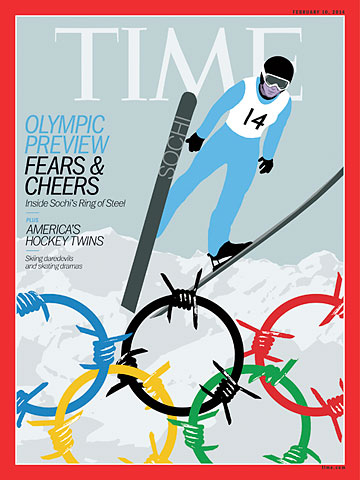
(2 of 3)
In a way, the insurgents have already succeeded in tainting these Olympics with fear. Although the Obama Administration has not advised athletes or spectators to stay away from Sochi, it warns of an "uptick in threat reporting." And the talk of "black widow" suicide bombers and Internet threats from purported terrorists has Olympians rethinking plans to have family members make the trip. It is eerily reminiscent of the Salt Lake City Games in 2002, just months after 9/11, when armed FBI agents patrolled the slopes of Park City along with the National Ski Patrol, waiting for terrorists to descend from 10,000 feet high in the Rockies. None did.
Snow Fortress
Despite the escalating threats, Putin does not arrive at the Laura complex with his usual cortege of a dozen armored cars. He doesn't need to. Sochi and its suburbs are already encircled in what authorities are calling the ring of steel, a security measure unprecedented in Olympic history. Some 40,000 troops have been deployed around Sochi, amounting to more than 10% of the city's population. (By comparison, a police force of 6,000 guarded the last Winter Games in Vancouver, a city 30% larger than Sochi.) Cars registered in other parts of Russia have been barred from the city for the duration of the Games, and Sochi residents are discouraged from driving at all. In the mountain cluster of Olympic venues above Sochi, getting on a ski lift or crossing a pedestrian bridge requires a security-screening process no less stringent than those at New York City airports.
In essence, the ring of steel has returned Sochi to its original state--that of a fortress on Russia's frontier. The armies of Czar Nicholas I erected its walls in the 1830s, when the Russian Empire was expanding southward to the Black Sea coast. Then as now, the main threat Russia faced in the region was not from foreigners but from the defiant gortsy, the local highlanders whose warfaring skills had been shaped by a history of fending off invaders, including the Romans, Persians and Ottoman Turks. Russia's struggle to subdue the gortsy took most of the 19th century, as even the Czars' most able caste of warriors--the Cossacks--struggled to pacify the native horsemen.
Ancient history and its grudges run through the present conflict, and Putin has revived some old-time methods for dealing with the threats. In 2008 he rearmed the Cossacks. Their military units had been disbanded in Soviet times, when the Communist Party persecuted their Orthodox Christian faith and derided their culture as a relic of the Russian monarchy. But less than a year after Russia was awarded the Games, the region that includes Sochi restored the Cossacks' official status (and government paychecks) as defenders of the Russian borderlands--the same function they served under the Czars. Visitors to the Olympics will find them patrolling Sochi and its suburbs in their traditional uniform of lamb's-wool hats and knee-high boots. "The Olympics will be our chance to prove our worth," says Vladimir Davydov, a local Cossack officer and Sochi city councilman. "So we cannot allow ourselves to fail in defending them."
